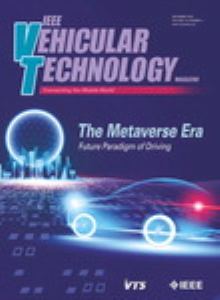基于随机几何的rsma辅助车辆网络分布式计算卸载
IF 7.1
2区 计算机科学
Q1 ENGINEERING, ELECTRICAL & ELECTRONIC
引用次数: 0
摘要
随着智能网联汽车和计算密集型相关应用的激增,对车联网(IoV)前所未有的低延迟和高吞吐量提出了关键要求。速率分割多址(RSMA)是一种很有前途的技术,可以在移动场景中实现高频谱效率和保持可靠的连接。受分布式计算思想的启发,设计了一种rsma辅助的车载网络分布式计算卸载方案(RDCOS),该方案采用随机几何方法引入各种计算辅助节点(can),以缓解任务车辆的计算困境。在分析了CAN配对和成功访问概率(SAP)的基础上,研究了任务车总卸载任务最大化问题。然后,提出了一种基于逐次凸逼近(SCA)的计算卸载优化算法(SCOOA)。性能评估结果不仅验证了所提模型的合理性,而且表明在移动条件下RSMA能显著提高总卸载任务,通过仿真验证了所提方案的优越性。本文章由计算机程序翻译,如有差异,请以英文原文为准。
RSMA-Assisted Distributed Computation Offloading in Vehicular Networks Based on Stochastic Geometry
The proliferation of intelligent connected vehicles and related applications with computation-intensive tasks has boosted a pivotal requirement for the unprecedented low latency and high throughput of the Internet-of-Vehicle (IoV). Rate-splitting multiple access (RSMA) has emerged as a promising technology for achieving high spectral efficiency and maintaining reliable connectivity in mobile scenes. Inspired by the idea of distributed computing, an RSMA-assisted distributed computation offloading scheme (RDCOS) in vehicular networks is designed, where various computation auxiliary nodes (CANs) are introduced in a stochastic geometry approach to alleviate the computation dilemma of the task vehicle. After analyzing the CAN pairing and the successful accessing probability (SAP), the total offloaded tasks maximization problem of the task vehicle is investigated. Then a successive convex approximation (SCA)-based computation offloading optimization algorithm (SCOOA) is developed to obtain the solution. The results of the performance evaluation not only verify the plausibility of the proposed model but also indicate that the RSMA can significantly promote the total offloaded tasks under moving conditions, which confirms the superiority of the proposed scheme through simulations.
求助全文
通过发布文献求助,成功后即可免费获取论文全文。
去求助
来源期刊
CiteScore
6.00
自引率
8.80%
发文量
1245
审稿时长
6.3 months
期刊介绍:
The scope of the Transactions is threefold (which was approved by the IEEE Periodicals Committee in 1967) and is published on the journal website as follows: Communications: The use of mobile radio on land, sea, and air, including cellular radio, two-way radio, and one-way radio, with applications to dispatch and control vehicles, mobile radiotelephone, radio paging, and status monitoring and reporting. Related areas include spectrum usage, component radio equipment such as cavities and antennas, compute control for radio systems, digital modulation and transmission techniques, mobile radio circuit design, radio propagation for vehicular communications, effects of ignition noise and radio frequency interference, and consideration of the vehicle as part of the radio operating environment. Transportation Systems: The use of electronic technology for the control of ground transportation systems including, but not limited to, traffic aid systems; traffic control systems; automatic vehicle identification, location, and monitoring systems; automated transport systems, with single and multiple vehicle control; and moving walkways or people-movers. Vehicular Electronics: The use of electronic or electrical components and systems for control, propulsion, or auxiliary functions, including but not limited to, electronic controls for engineer, drive train, convenience, safety, and other vehicle systems; sensors, actuators, and microprocessors for onboard use; electronic fuel control systems; vehicle electrical components and systems collision avoidance systems; electromagnetic compatibility in the vehicle environment; and electric vehicles and controls.

 求助内容:
求助内容: 应助结果提醒方式:
应助结果提醒方式:


